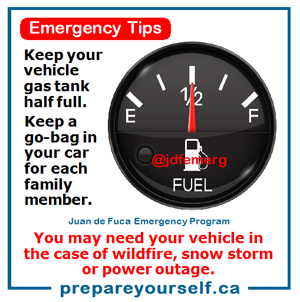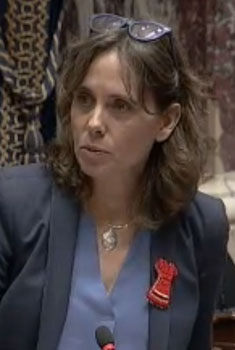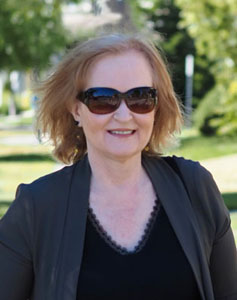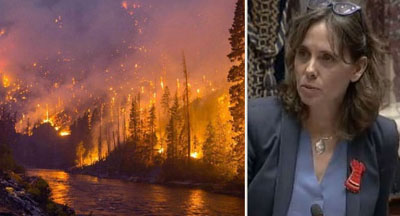
Thursday October 5, 2023 | VICTORIA, BC [Updated 3:31 pm]
by Mary P Brooke | Island Social Trends
“Don’t accept that this is the new normal,” says BC Green Leader Sonia Furstenau regarding the range of climate-related emergencies and crises that have become frequent in BC over the last few years.
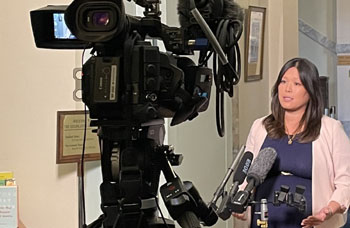
Addressing and supporting the BC government’s Bill 31 (Emergency and Disaster Management Act), she noted the heat dome and the intense atmospheric river of 2021 as well as the increasingly intense wildfires with a highlight about decimation of the small town of Lytton due to wildfire.
Bill 31 was introduced in the house two days ago (October 3) by Emergency Management and Climate Readiness Minister Bowinn Ma. She said the new bill is “the culmination of many years of collaborative work with Indigenous partners, it is the most comprehensive and forward-looking emergency management framework in Canada”.
“A changing climate means people and communities around B.C. are feeling the effects of extreme weather emergencies like never before,” said Premier David Eby earlier this week.
The new act, if/once passed, will replace the Emergency Program Act, which has not been substantially updated since 1993. Regulations to flesh it out will be composed up until year-end.
Short and long-term:
Furstenau outlined what she sees as different human responses to short-term and long-term emergencies.
She pointed out that “short emergencies bring out the best in us”, articulating that”we are connected to each other and to the world around us, and we react in that way — the best of who we are”.
By comparison, she said that “long emergencies erode that basic sense of who we are”.
People and things are connected:
“We have to stop pretending that things aren’t connected,” said Furstenau in the BC Legislative Assembly today, elaborating that things should be dealt with “one thing at a time”.
The BC Green leader pointed out that “the people you need the very most when an emergency hits are your neighbours”, not the call center or government office.
NDP remarks today:
Jennifer Rice — who is now Parliamentary Secretary for Rural Health (but in 2017-2020 was the Parliamentary Secretary for Emergency Preparedness) — said today during second reading of Bill 31, that the legislation is forward-thinking. “We are now focussing on the future and the four pillars of emergency management, and we are not just responding,” said Rice.
She seemed to be surprised that there have been incidents that have “had to make us rethink”. She admitted to not having read up on pandemics prior to when COVID-19 hit in mid-2020.
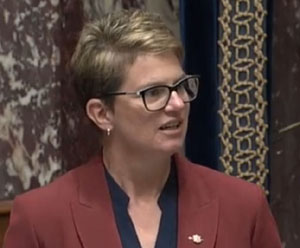
“The new ministry includes the word climate change is realistic for this day and age,” and gave “kudos to the public service who have worked on this legislation for the past three years…. they did this off the sides of their desks during all kinds of incidents”.
“We have to respond but also do future planning, she said. Kudos to us for actually getting there,” said Rice. she noted that staff were seconded from other ministries to deal with recent climate-related emergencies.
NDP MLA Mike Starchuk (Surrey-Cloverdale) — himself a former firefighter — said he is pleased there is a task force to work through the details of the bill.
Opposition comment:
Today during second reading of Bill 31, Tom Shypitka, MLA (BC United) emphasized the importance of consulting and engaging with First Nations as to their centuries of knowledge in dealing with wildfires.
===== GOVERNMENT LINKS:
Emergency and disaster management act:
https://www2.gov.bc.ca/EmergencyManagementAct
Declaration on the Rights of Indigenous Peoples Act:
https://www2.gov.bc.ca/gov/content/governments/indigenous-people/new-relationship/united-nations-declaration-on-the-rights-of-indigenous-peoples
United Nations Framework on Disaster Risk Reduction:
https://www.undrr.org/implementing-sendai-framework/what-sendai-framework
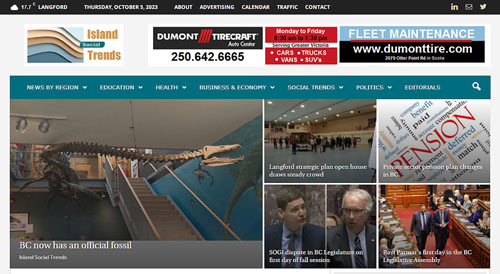
===== ABOUT ISLAND SOCIAL TRENDS:
Island Social Trends reports on news of the day through a socioeconomic lens, with an eye to how politics shapes the lives of individuals and households and how it impacts businesses and communities — with the aim to create an archive of both highlights and key points in detail.
Created in mid-2020 by Editor and Publisher Mary P Brooke, Island Social Trends is available at IslandSocialTrends.ca for anyone to read — as part of Ms Brooke’s philosophy that citizen discourse should be available to all.
Mary P Brooke launched Island Social Trends after creating, editing and publishing three print publications on the west shore of south Vancouver Island which are now archived in the Sooke Region Museum permanent collections: MapleLine Magazine (2008-2010), Sooke Voice News (2011-2013), and West Shore Voice News (2014-2020).
Mary P Brooke was nominated for a Jack Webster Award in 2023 to recognize her contribution to community through journalism. She reports with the BC Legislative Press Gallery.
Mary Brooke is the proud mom of four (now grown) children who attended public schools in BC (SD61, SD62, SD72). She ran as a school trustee candidate in SD62 in 2022.
Support for this process of independent journalism is appreciated. ADVERTISE | SUBSCRIBE



